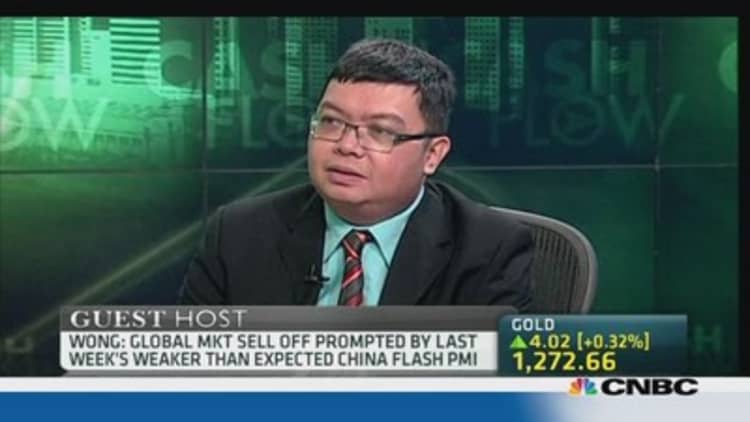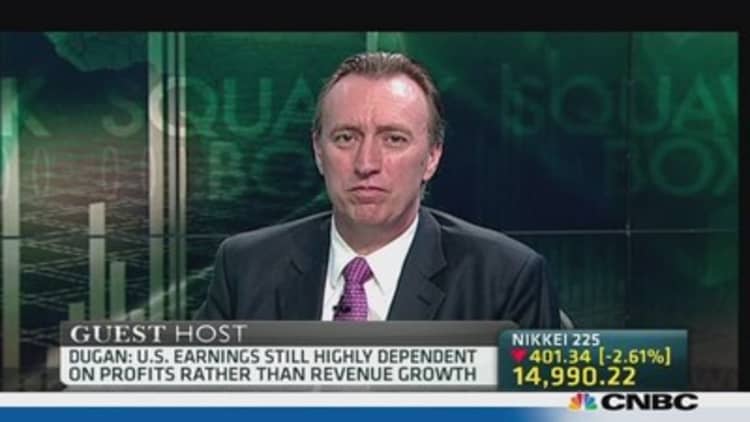
China's economic woes may appear to be behind the recent bout of risk aversion in emerging markets, but strategists say that a culmination of three distinct factors at play.
"The reported trigger for this sell-off was a weaker-than-expected Purchasing Managers' Index (PMI) out of China (last week). The actual reasons are a bit more complex than that," Patrick Chovanec, managing director at Silvercrest Asset Management Group wrote in a note.
(Read more: Emerging markets rout a reality check for Davos elite)
In addition to a resurgence of fears over a hard landing in the world's second largest economy, Argentina's decision to abandon its policy of intervening in the foreign exchange market and ongoing concerns over the Federal Reserve tapering its quantitative easing program have also dampened investor risk appetite.
"It's important to remember that they are problematic for different reasons. The factors affecting Turkey are not the same as those affecting Russia or Argentina. But markets tend to paint with a broad brush," said Chovanec.
The Argentine peso has led the selloff in emerging market currencies, falling almost 20 percent against the U.S. dollar last week, while the South African rand, Brazilian real, Russian ruble and Turkish lira have also weakened, hitting multi-year lows.
For the currencies such as the Brazilian real, South African rand and Russian ruble, which export raw materials to China, the mainland's economic data was the focus, said Chovanec.
"More worrying that the weak manufacturing number is growing alarm that China may soon face large defaults in 'shadow' lending, which has been critical to funding that boom," he added.
(Read more: Did the Fed sinkthe emerging markets?)
Whereas for the Argentine peso, the primary reason for the collapse has been internal. Last week, the country's central bank scaled back support for the currency in order to preserve international reserves which are at a seven-year low.
"Years of state intervention and economic populism under President Cristina Kirchner and her husband, who preceded her in office, have undermined the investment climate and sparked rampant inflation," Chovanec said.

"These problems have prompted capital to try to flee the country, draining the country's foreign exchange reserves. It is becoming increasingly doubtful whether Argentina has enough FX reserves to prevent the peso from collapsing," he said.
Finally, for Turkey, the immediate problem is the U.S. tapering its monetary stimulus, given the country runs a large trade deficit that must be financed by capital inflows. The Turkish lira fell to $2.386 in mid-morning trade but pared losses after the central bank announced an emergency rate meeting for Tuesday.
(Read more: Emergingmarkets to pay the price if Abenomics fails?)
"We saw this take place last summer, when Bernanke first started talking about tapering. Then when the Fed didn't taper in September, they breathed a sigh of relief. Now the taper is back on," said Chovanec.
An additional reason behind why the selloff is broad-based is that investors are pulling money out of global emerging market exchange-traded funds (ETFs) that are invested in a wide range of markets.
(Read more: Are emergingmarkets on the brink of another crisis?)
The MSCI Emerging Markets index, for example, has fallen almost 4 percent over the past week.
"Investors buy emerging markets ETFs; they don't buy specific stocks in the Philippines or Argentina. So if they decide to take fright at what's happening in one or two of the big countries, they sell everything," said Jim Walker, founder and managing director of Asianomics.
In the week ended January 22, outflows from U.S.-domiciled emerging market equity funds of $422.41 million, the sixth week of outflows out of the last seven, data from Thomson Reuters Lipper service showed.
—By CNBC's Ansuya Harjani. Follow her on Twitter:@Ansuya_H


